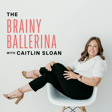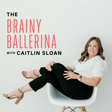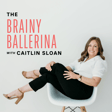
53. Ballet without Brutality: Tanya Trombly’s Bulletproof Approach to a Dance Career
Tanya Trombly, a freelance ballet dancer with over 20 years of professional career experience and founder of Bulletproof Ballerina, sits down with me today to discuss how her stubbornness and tenacity has helped her vision and goals become a reality.
We chat about what it’s like to go through the mental and physical challenges that come with relying so much on what you look like and how Tanya overcame those challenging obstacles in order to get to a much healthier place in both her life and career.
Much of the work that Tanya focuses on revolves around helping other dancers build confidence around the bodies that they were born with. Tanya shares that she feels as though she wasted so much time trying to change her body and now she wants to educate other ballet dancers on how to nourish their bodies rather than deplete them.
Key “Pointes” in this Episode :
- Early Dance Days: How growing up at a more casual studio was a better fit than a ballet conservatory
- Dance in College: Why Tanya chose Mercyhurst University
- Transition to the Professional World: Why Tanya didn’t think she’d make it as a ballerina and what helped her land her first professional contract
- Freelancing: What it takes to sustain a 20+ year career as a freelancer in NYC
- Health and Fitness: Why Tanya has built a business around these concepts
- Self-destruction vs. Nurturing: How Tanya is helping other dancers heal
- Business Growth: How dance has helped Tanya grow her business
- What the Future Holds: Tanya shares her big dreams she is currently pursuing
Connect with Tanya:
INSTAGRAM: @bulletproof_ballerina
WEBSITE: bulletproofballerina.com
Links and Resources:
Set up ticketing for your next event with DRT (Make sure to mention that The Brainy Ballerina sent you!)
Get your copy of The Intentional Career Handbook
1-1 Career Mentoring: book your complimentary career call
Let’s connect!
My WEBSITE: thebrainyballerina.com
INSTAGRAM: instagram.com/thebrainyballerina
Questions/comments? Email me at caitlin@thebrainyballerina.com
This episode was brought to you by the Pivot Ball Change Network.


